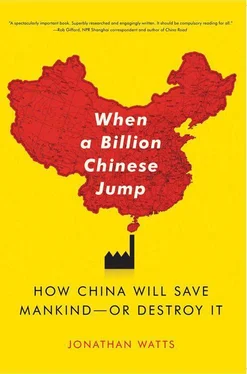I looked for the portrait of my guide, Deputy Secretary Sun. Before liberation, the poster said, he had lived in a house of 40 square meters. Now his home was more than ten times bigger and he owned shareholdings and bank deposits worth 710,000 yuan ($101,428). The poster also listed one car, one computer, two mobile phones, two air conditioners, a camera, two TV sets, a stereo, a fridge, two phones, two motorbikes, a washing machine, and a set of redwood furniture. Knowing that he had come from a poor background, I told him how impressed I was. He shrugged, and not just from modesty.
“It is a little out of date,” he said. He now owned a lot more.
7. From Horizontal Green to Vertical Gray
Chongqing
Every five days for the next forty-two years, we will build a city of over a million people. Where we put them will be crucial.
—Joel Cohen, demographer 1
While industrial villages like Huaxi expand outward to become towns and cities, hundreds of millions of people from the countryside are drawn in to work on the construction sites and assembly lines they create. The result is momentous.
For the first time since the dawn of civilization, Homo sapiens has become a predominantly urban creature. Until 2008, the planet’s population was split almost right down the middle: 3.2 billion in the cities, 3.2 billion in the countryside. 2Since then China has shifted the balance decisively away from the fields and toward the skyscrapers. Our species has taken a step further than Darwin anticipated. We have not evolved to fit our environment, we have changed our habitat to suit ourselves. 3
Nowhere is the staggering urbanization of the world more evident than in Chongqing, the Coketown of the early twenty-first century. Centered on a large finger of land between the dark waters of the Jialing River and the chocolate-colored Yangtze, this former trading center has become the world’s biggest municipality with 31 million residents, more than Iraq, Peru, or Malaysia. 4
Many outsiders have never heard of it, yet it is on its way to becoming one of the planet’s megacities, with an urban population of 10 million that is on course to double again before 2020.
I wanted to get a snapshot of how this affected people and their environment, so I spent a day there—just the sort of day, in fact, when humanity passed the balancing point on its millennia-long journey out of the countryside.
I woke at 5 a.m. and set out in the rain to the poor district of Qiansimen. In the hour before dawn, it had a distinctly Dickensian feel. Puddles filled the dark narrow alleys, flanked on either side by tall ramshackle tenements. An old man’s wrinkled faced glowed orange as he warmed himself over a brazier.
Nestling between the port and the commercial center, this area was the home of Chongqing’s most distinctive and traditional population—the bangbang army, a 100,000-strong crew of porters who bore the city’s weights on their shoulders. Arriving from the countryside with no skills and minimal education, they picked up the cheapest of tools—a bamboo pole (or bangbang ) and some rope—and hung around the docks, the markets, and the bus stations waiting for goods to carry up the steep slopes of this mountain port.
I had arranged to meet one of them, Yu Lebo. He had just woken up in the cramped three-room apartment he and his wife shared with three other couples, all of whom were porters, cleaners, or odd-job men. There were two double mattresses on the floor in one room, separated by a thin curtain, a third in a tiny room next door and another in the kitchen. Yu scrubbed his face, grabbed a bamboo pole hanging from a hook on the wall, and headed out into the rain and the dark. “We want to move out and get a place of our own, but we don’t have the money yet,” he said once we were outside. He explained why he had come to Chongqing four years earlier: “I used to be a farmer, but I could not afford to raise my two children. So we left them behind with relatives. I see them two or three times a year.”
On an average day, Yu earned about 20 yuan ($3) for twelve hours’ work. Most of this, and the money his wife added as a cleaner, went on rent and food, but as long as they remained healthy they could send enough money home to buy clothes and books for their children. The remittances were vital. Education and health care—free in the days of Mao Zedong—had become the biggest burden on the rural community.
Yu’s first job of the day was in the Chaotianmen market, where he had to carry several huge bundles of goods. Each was probably heavier than the short, slim porter, who weighed just over 50 kilograms. The stallholder paid him 2 yuan. “Not bad,” Yu said. “Sometimes they are heavier. Sometimes we get paid less.” Average incomes in the city were more than three times higher than in the countryside, 5but inequality was widening everywhere. I asked Yu if he regretted coming. He shook his head. “No, my life is a little better than it was when I first got here. Then, I only earned 10 yuan a day. This city is changing so fast. It is getting richer. But our lives are not keeping up. Cities are good for the rich. If you have money you can do anything. If you don’t want to carry something, you just hire a bangbang man.”
Even after dawn, the sun remained hidden behind a thick haze. The giant movement of humanity that was Chongqing was about to get into full swing, working, building, consuming, discarding, developing. If today was typical, builders would lay 137,000 square meters of new floor space for apartment buildings, shopping centers, and factories. The economy would grow by 99 million yuan ($14.1 million). There would be 568 deaths, 813 births, and the arrival of 1,370 people from the countryside. Each year, the city limits were being pushed farther outward as the urban population grew by half a million, the equivalent of all the people in Luxembourg being added to the municipal register.
This represented a massive change from the Mao era, when the government tried to halt, and at certain periods even reverse, the shift to the cities. 6In the thirty years from 1949 to 1979, the urban population actually declined relative to the birthrate as Mao moved people into remote regions to grow crops. By 1980, only 100 million people lived in cities, and the household residency system tightly restricted movement from one area to another. This policy changed completely during the next ten years, when Deng Xiaoping unleashed the biggest and fastest migration in history and more than 400 million farmers moved into towns and cities.
The story of modern China is the story of that movement. Low-paid, routinely abused, and often working in appallingly dirty and unsafe conditions, migrants provided the human fuel for China’s spectacular economic growth. Most returned to their hometowns only once a year, during the spring festival, when they could expect a hero’s welcome as they arrived with striped nylon bags full of gifts for their families and envelopes containing their savings. This annual migration is bigger than the hajj, its financial impact enough to make or break a midsized country. In Anhui, the remittances were worth more than the provincial budget.
By moving, people were also reshaping their nation’s identity and its relationship to the environment. For 3,000 years China had been a country of farmers. Suddenly, it was a land of city dwellers. Britain has five urban centers of more than a million people; China has more than 120. A few—Beijing, Shanghai, Hong Kong, and Nanjing—are well known around the world. The names of many others—Suqian, Suining, Xiantao, and Xinghua—are unfamiliar even to many Chinese. Building them required cement, steel, and timber. Once complete, homes required electricity for fridges, microwave ovens, TVs, and air conditioners. This was the government’s formula for raising living standards.
Читать дальше










